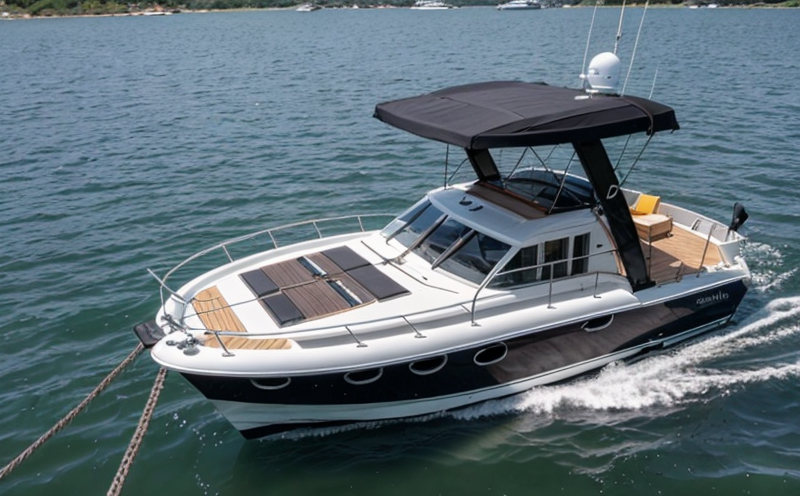ISO 1704 Chain Cable Strength Testing for Anchoring Systems
The ISO 1704 standard provides a framework to ensure that chain cables used in marine and ship anchoring systems meet stringent safety requirements. This service ensures compliance with international standards, ensuring the reliability of equipment under harsh environmental conditions.
Chain cables are critical components in ship mooring and anchoring systems. Their primary function is to transmit the forces generated during anchor engagement into the seabed, securing ships against wind and wave action. Given that marine environments are notoriously challenging—subject to saltwater corrosion, high humidity, and mechanical stress—the integrity of these cables must be guaranteed at all times.
The ISO 1704 Chain Cable Strength Testing procedure involves subjecting samples to a series of static load tests designed to replicate the forces they would experience in real-world scenarios. This includes tension testing, fatigue testing under cyclic loading, and corrosion resistance testing. The aim is to verify that the chain cables can withstand these conditions without failure.
The testing process begins with careful selection and preparation of the specimens. These chains are typically cut into lengths appropriate for testing and may undergo surface treatments such as galvanization or painting before testing. Once prepared, they undergo a series of tests:
- Static Load Testing: Chains are subjected to maximum design loads to determine if there is any permanent set.
- Fatigue Testing: Cycles of loading and unloading replicate the dynamic forces experienced during ship movement.
- Corrosion Resistance Testing: Samples are exposed to saltwater for extended periods to assess their resistance to rusting or deterioration.
After testing, detailed reports are generated. These include load-deflection curves, fatigue life predictions, and corrosion rates. Compliance with ISO 1704 ensures that the chain cables can reliably perform their function in critical maritime operations without compromising safety or operational efficiency.
The importance of this testing cannot be overstated. Accidents involving ships due to anchor failure are costly not only in terms of repairs but also in potential human lives lost and environmental damage. By adhering strictly to ISO 1704, we help prevent such incidents, ensuring safer maritime operations for all involved.
Benefits
- Enhanced Safety: Ensures that chain cables can withstand the rigors of marine environments and operational demands without failure.
- Compliance with International Standards: Adherence to ISO 1704 ensures that equipment meets global safety and quality standards.
- Prolonged Equipment Life: Testing helps identify potential weaknesses early, allowing for necessary repairs or replacements before they become critical issues.
- Cost Savings: By preventing failures through rigorous testing, the overall cost of maintenance and repair is significantly reduced.
- Reputation Enhancement: Demonstrating compliance with stringent international standards can enhance a company's reputation in the maritime industry.
Eurolab Advantages
Eurolab offers expertise and infrastructure unparalleled in the field of marine equipment testing. With state-of-the-art facilities, we employ highly skilled professionals who understand the unique challenges faced by the maritime industry.
- Accreditation: Our laboratory is fully accredited to ISO/IEC 17025:2017, ensuring that all tests are conducted under strict quality control and compliance with international standards.
- Experience: Our team has extensive experience in marine equipment testing, providing insights into best practices for maintaining high standards of safety and performance.
- Technology: Equipped with advanced instruments capable of precise measurements and data analysis, ensuring accurate results every time.
- Support: Our dedicated customer support team is available to provide guidance on testing procedures, interpretation of results, and any other queries you may have.
Partnering with Eurolab means not only getting the best possible test results but also gaining access to a wealth of knowledge and resources that can help improve your operations and ensure compliance with international standards.
Use Cases and Application Examples
| Use Case | Description | Application Example |
|---|---|---|
| Maintenance Planning | Determining the remaining useful life of chain cables to inform maintenance schedules. | Identifying a cable that is approaching its fatigue limit, prompting immediate replacement before it fails during critical operations. |
| New Product Development | Evaluating new designs or materials for their suitability in marine environments. | Testing innovative corrosion-resistant coatings on chain cables to ensure they meet the required standards and extend operational lifetimes. |
| Compliance Verification | Ensuring that existing equipment complies with current regulations and international standards. | Verifying compliance of a ship's anchor system with ISO 1704 before it embarks on an international voyage. |
| Risk Management | Evaluating the risks associated with using substandard or outdated equipment in maritime operations. | Assessing the risk posed by a chain cable that has not been tested for several years, leading to its replacement before potential failure during a critical operation. |
| Accident Investigation | Determining the cause of anchor-related incidents involving chain cables. | Investigating an incident where a ship's anchor failed due to a defective chain cable, using ISO 1704 testing results to establish the root cause. |
| Purchase Decision Support | Evaluating different suppliers or brands of chain cables for quality and reliability. | Comparing two brands of anchor chains by conducting ISO 1704 tests, thereby informing procurement decisions based on performance data. |
| Operational Efficiency Improvement | Evaluating the efficiency of different types of anchors and mooring systems in various environmental conditions. | Testing chain cables from different anchor systems to determine which combination provides optimal performance under specific weather and water conditions. |





